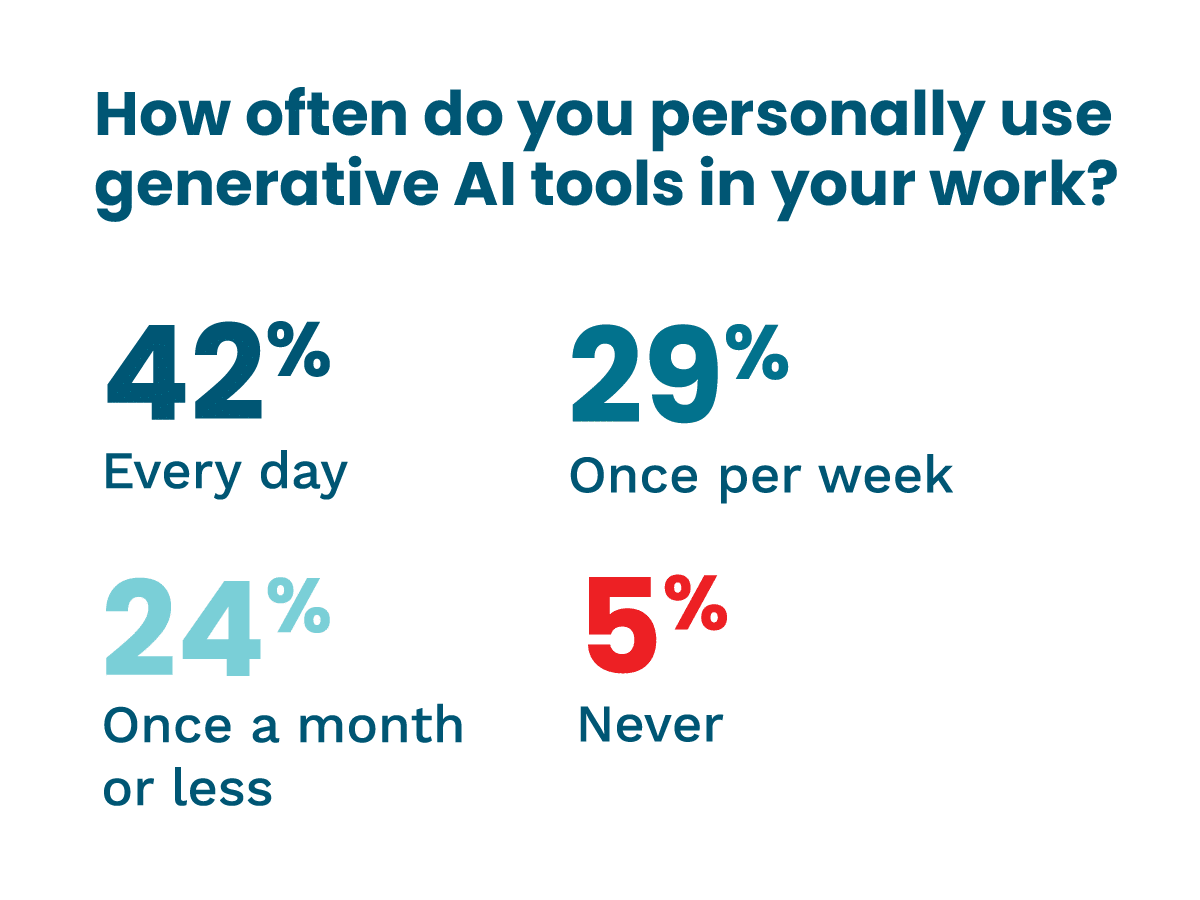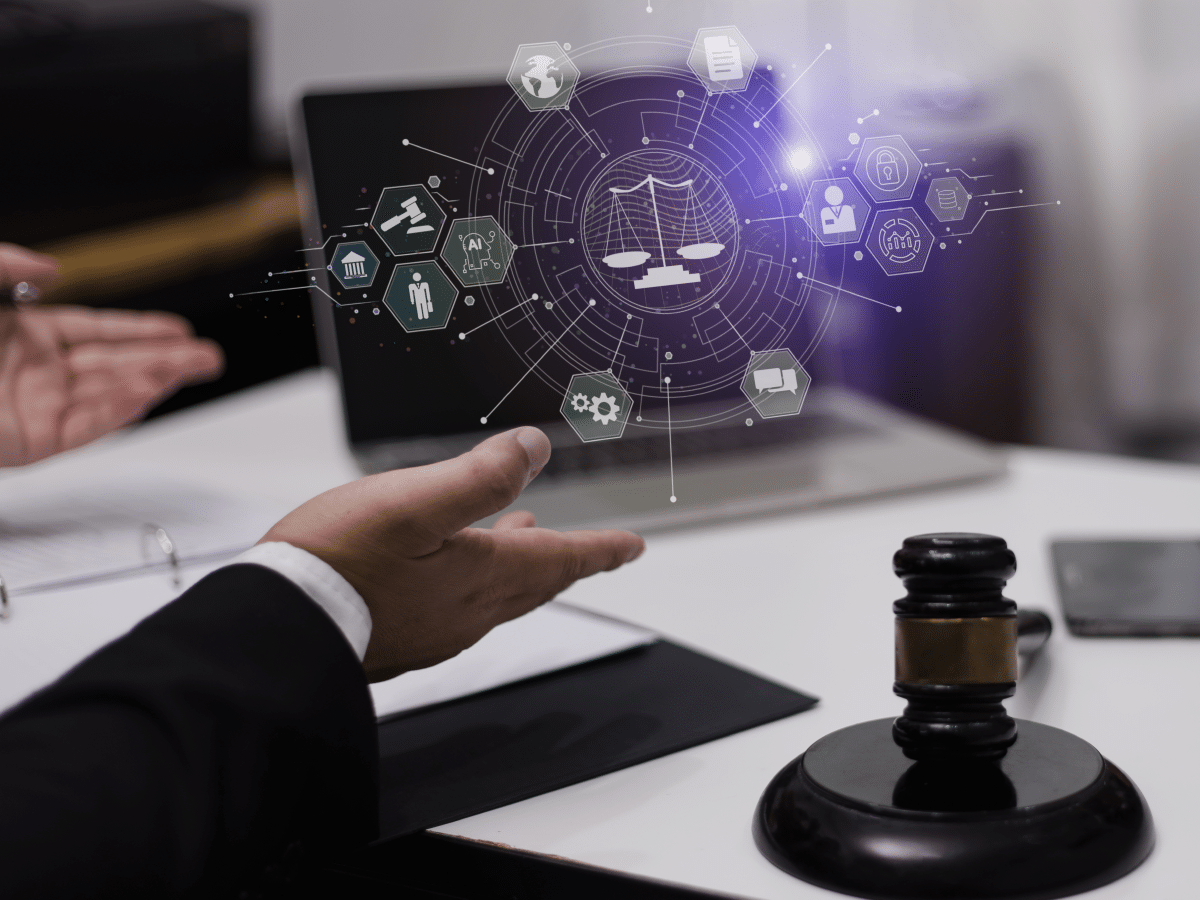The primary aim of artificial intelligence (AI), particularly in the legal industry, is to streamline operations that traditionally require extensive human intervention. Generative AI (GAI), like the popular ChatGPT tool, emulates human cognitive functions like learning, problem-solving, and decision-making. By automating routine and time-consuming tasks, AI liberates legal professionals from the drudgery of rote work, allowing them to concentrate on the more strategic aspects of their practice. This shift is not just about saving time or cutting costs; it’s about enhancing the precision and effectiveness of legal services.
Key transformative impacts of AI in law include:
Competitive Advantage: Boosts business performance by enhancing efficiency, accuracy, and client service.
Operational Efficiency: Enhance daily operations to minimize manual labor.
Predictive Analysis: Use data to forecast outcomes and guide decisions.
Accuracy and Reliability: Reduce errors through automated processes.
Research Capabilities: Speed up legal research with advanced tools.
Client Engagement: Improve client service with more tailored and efficient interactions.
This blog post provides a comprehensive overview of AI applications, benefits, and critical considerations for legal professionals aiming to maintain a competitive edge in an increasingly digital-first industry.
AI liberates legal professionals from the drudgery of rote work, allowing them to concentrate on the more strategic aspects of their practice.
Understanding AI in the Legal Context
Below, we delve into the different types of AI technologies being utilized by legal professionals and explore key applications within the legal field.
Definition and Types of AI in the Legal Field
You may hear some of these terms whenever AI and new technologies are discussed. Knowing these terms empowers you to make informed decisions when integrating AI and new technologies into your law firm.
Machine Learning (ML): ML technology enables systems to autonomously learn and improve from experiences without explicit programming. In the legal realm, ML is particularly valuable for analyzing vast amounts of data to identify patterns, which can enhance decision-making and operational efficiency over time.
Natural Language Processing (NLP): NLP allows machines to understand and interpret human language, making it indispensable in legal settings. It powers functions such as analyzing large volumes of legal documents or facilitating more intuitive interactions between lawyers and their digital tools.
Predictive Analytics: This technology uses historical data to forecast future events, which can be pivotal information for legal professionals. Predictive analytics assists lawyers in developing case strategies and assessing risks by predicting potential outcomes of cases, thus informing better tactical decisions.
Robotics Process Automation (RPA): RPA employs software robots or “bots” to automate repetitive and routine tasks. By taking over such tasks, RPA frees up legal professionals to concentrate on the more complex and high-value aspects of their work, significantly boosting productivity and reducing errors.
Emerging Trends in AI and Legal Tech
According to the MyCase and LawPay 2024 Legal Industry report, AI innovations are already being used heavily within the profession, with 42% of early adopters using them daily. Many law firms also noted significant improvements in task execution speed and accuracy. This not only boosts the capacity for handling more cases but also enhances the quality of service provided to clients by allowing lawyers to focus more on nuanced legal work rather than administrative duties.
We are just beginning to understand how AI will shape the practice of law as its advancement continues. But one thing is certain: Legal professionals are poised to experience a shift in their roles, emphasizing more strategic activities as AI takes on the more mundane tasks.

Innovations in Legal Technology
As AI and legal technology continue to evolve, lawyers must adapt to these changes to stay competitive and efficient. Embracing these technologies improves the delivery of legal services and opens up new avenues for practice and innovation in the legal sector.
Blockchain and Smart Contracts
Blockchain technology offers a secure, transparent, and immutable way to keep records. It’s particularly useful in the legal industry for evidence preservation, managing intellectual property rights, and securing transaction records. Smart contracts, powered by Blockchain, automate and enforce the terms of a contract without the need for intermediaries, streamlining operations in practice areas such as real estate and intellectual property.
AI-Powered Legal Research Platforms
Research platforms that utilize AI can sift through vast amounts of legal data, including statutes, case laws, and regulations, at unprecedented speeds. They provide precise, relevant legal insights, significantly reducing research time and enhancing the accuracy of legal advice.
Virtual Law Firms
Cloud computing, AI, and advanced online collaboration tools enable virtual law firms to operate without traditional physical office spaces. This model enables the provision of flexible, cost-effective legal services to a global clientele. By reducing overhead costs associated with maintaining physical offices, staffing, and administrative expenses, virtual law firms can significantly lower their operational expenses. These savings are then passed onto clients through more competitive pricing, allowing clients to access high-quality legal services at a fraction of the cost of traditional firms. Additionally, the use of AI and automation streamlines routine tasks, further enhancing efficiency and reducing billable hours, thus saving clients even more on legal fees.
Advanced Legal Analytics
AI tools analyze court documents, opinions from judges, and litigation data to predict outcomes, identify trends, and provide strategic insights. These tools are invaluable for lawyers seeking a competitive advantage in their case strategies.
Key Applications of AI in Legal Work
This technological evolution presents an opportunity for lawyers to leverage AI to enhance their practice, improve client service, and innovate in legal service delivery
Legal professionals can use AI in various ways, including:
Contract Analysis and Management: AI dramatically speeds up contract review by automatically flagging potential issues and ensuring compliance with relevant laws and regulations. This helps mitigate risks and enhance the efficiency of legal operations
Legal Research: AI streamlines legal research processes, enabling lawyers to obtain comprehensive insights faster than traditional methods
E-Discovery and Document Review: During the discovery phase of litigation, AI can efficiently sift through vast amounts of data to identify relevant documents. This capability not only speeds up the document review process but also assists in crafting more informed responses to discovery requests
Predictive Case Outcome Analytics: AI tools offer data-driven predictions on case outcomes, providing lawyers with valuable insights that help with strategic planning and client advising
Writing and Client Communications: Enhance your writing and client communications with AI-powered tools that edit, summarize, and refine your content quickly and efficiently. Advanced text editing and translation capabilities improve the tone and accuracy of client communications
Legal Chatbots and Virtual Assistants: These AI-powered tools improve client service by responding immediately to inquiries and supplying information 24/7. These tools can handle routine queries, freeing resources and enabling legal professionals to focus on more complex issues
Future Outlook and Predictions
The future of AI is set to bring significant advancements in both functionality and application, revolutionizing the legal industry and transforming how professionals work. Intelligent case search capabilities will revolutionize research by understanding the context of legal queries, providing relevant case citations, and suggesting applicable strategies based on historical data and outcomes. This enhanced functionality will make legal research more intuitive and efficient, significantly reducing the time lawyers spend on these tasks.
Meanwhile, intelligent firm search technology will change how clients find law firms and lawyers. Moving beyond traditional criteria like location or specialization, AI will enable clients to choose law firms based on success rates, client reviews, and specific expertise, ensuring a better alignment between client needs and the legal services offered.
In terms of analytics, intelligent insights through predictive analytics will soon provide deeper insights into historical case data and billing practices. These insights will assist in forecasting legal service costs through predictive billing models, allowing firms to price legal services more competitively.
Lastly, intelligent automation will further enhance the efficiency of legal processes. This technology will streamline the analysis of legal documents, predict case outcomes, and recommend negotiation strategies, transforming traditional legal work and improving legal outcomes.
In all, AI’s integration into the legal profession is setting the stage for a more dynamic, precise, and efficient legal practice landscape.
As AI and legal technology continue to evolve, lawyers must adapt to these changes to stay competitive and efficient.
Benefits and Challenges of AI in the Legal Industry
The integration of AI is revolutionizing how legal work is conducted, significantly boosting productivity, efficiency, and the quality of services provided. Let’s take a look at some of the key benefits already manifesting.
Increased Productivity
As you might expect from what we’ve learned so far, streamlined workflows are a key driver for both individual and law firm AI adoption. According to the MyCase and LawPay 2024 Legal Industry report, the top reason cited for personal use of GAI was to increase productivity and efficiency (81%).
Task Management
Task management is revolutionized in the legal industry with these AI-driven tools:
AI Task Scheduler: This tool streamlines task allocation and prioritization, ensuring that all deadlines are met efficiently without the need for manual oversight
AI Task Assistant: This tool offers personalized recommendations for task management based on urgency, deadlines, and lawyers’ individual work habits, optimizing workflow and productivity
AI-Powered Task Management: Fully integrated with legal practice management software, this tool facilitates seamless management of case-related tasks, reminders, and follow-ups
Time Management
Efficient time management is crucial in legal settings, enhanced by the following AI applications:
Intelligent Scheduling: Coordinate meetings, court dates, and other important events by considering all participants’ availability to find the best possible time slot
Smart Scheduling Software: Automatically schedule and reschedule appointments as needed, optimizing calendars for maximum efficiency
Document Automation, Translation, and Text Editing
AI is drastically impacting how documents are handled within law firms, improving accessibility and efficiency:
Document Translation: Provide accurate, real-time translation of legal documents across multiple languages, enabling law firms to handle international cases without language barriers
Document Summarization: Extract key points and summaries from lengthy legal documents, streamlining information processing and aiding in faster, more informed decision-making
Text Editing and Generator: Enhance written legal content by ensuring clarity, precision, and adherence to legal terminology, significantly speeding up document drafting
Legal Workflow Automation and AI-Driven Legal Insights
AI in the legal industry facilitates significant improvements in the management and operational efficiency of legal proceedings:
Case Management Efficiency: AI predicts case timelines, automates document filing, and tracks case progress, enhancing the management of legal proceedings
Legal Operations Automation: This software automates a wide range of legal operations, including billing, client communications, and compliance checks, improving operational efficiency
Legal AI Insights: Provide data-driven analyses for refining case strategy, conducting risk assessments, and staying informed on legal trends
By embedding AI into these key areas, law firms can leverage technology to enhance service delivery, reduce manual labor, and efficiently address complex challenges.
In all, AI's integration into the legal profession is setting the stage for a more dynamic, precise, and efficient legal practice landscape.
Key Challenges and Ethical Considerations
While AI in the legal profession offers numerous benefits, it also presents several challenges and ethical considerations that require careful management:
Accuracy of Output: Ensuring that AI systems deliver accurate and reliable results is critical, as errors can have significant legal implications
Data Privacy and Security: Law firms handle sensitive information, necessitating robust security measures to protect client data from breaches. Legal professionals should also consider several key ethical concerns,
including how they bill for work done with the assistance of AI tools
Bias in AI Algorithms: AI systems can perpetuate existing biases if not properly designed and monitored, potentially leading to unfair or discriminatory outcomes
Job Displacement Concerns: AI’s ability to automate tasks traditionally performed by legal staff may lead to a shift in job roles within the industry, requiring a reevaluation of skills and employment structures
Regulatory Compliance: The legal frameworks governing the use of AI are still evolving. Law firms must stay informed and compliant with new laws and standards to avoid legal pitfalls
By strategically addressing these challenges and leveraging AI’s capabilities, law firms can significantly enhance their operational efficiency and the delivery of services, ensuring they remain at the cutting edge of the legal industry’s transformation.
Which Legal Professionals Should Consider Utilizing AI?
AI offers various benefits to different roles within law firms. Here’s how different legal professionals can leverage AI to enhance their work and improve overall firm efficiency.
Lawyers
Lawyers benefit from AI in law, using tools like ChatGPT for lawyers to analyze legal precedents and synthesize insights for stronger case strategies. AI-driven document management systems streamline the review process by extracting critical insights and generating actionable timelines, improving courtroom preparedness and client satisfaction through timely, informed interactions.
Legal/Administrative Assistants
Legal and administrative assistants experience a transformation in their workflow with AI in the legal field. Tasks such as scheduling, client communications, and document filing are automated, allowing them to focus on more strategic activities. AI assists in drafting documents that adhere to the required standards, ensuring compliance and precision.
Operations Managers
Operations managers leverage AI in the legal industry for resource optimization and process automation. AI-driven analytics predict workflow volumes and optimize operations, enhancing efficiency and reducing costs. This integration of AI in law firms supports better resource allocation and streamlined client services.
Financial Managers
Financial Managers utilize generative AI for lawyers to automate billing and invoicing, ensuring accuracy and consistency. AI also plays a crucial role in financial planning, analyzing data to forecast trends and financial scenarios and aiding in strategic decision-making.
Human Resources
Human resources benefits from AI in the legal profession through enhanced recruitment processes. AI streamlines candidate selection, automates interview scheduling, and facilitates efficient onboarding. Performance management is also optimized through AI insights, which assess productivity and highlight areas for improvement.
AI for Law Firms: Resources and Tools
AI Software and Platforms for Legal Professionals
Explore these innovative tools designed to enhance the practice of law through sophisticated AI technologies:
MyCase IQ is an intelligent legal AI that offers an advanced suite of AI-powered tools designed to enhance the productivity and accuracy of legal professionals—directly in their MyCase account. Each feature, some of which are currently still in beta testing, within the suite is tailored to streamline specific aspects of legal work, including:
Intelligent Document Summary: This feature automatically generates concise summaries of legal documents. It helps legal professionals quickly grasp essential points without combing through extensive texts, saving time and allowing for focus on critical matters.
Intelligent Text Editing: This tool aids in refining legal documents by suggesting edits for clarity, coherence, and legal precision. It uses advanced language processing algorithms to ensure that text meets high legal writing standards.
Intelligent Drafts: Intelligent Drafts assist in creating legal documents by automatically generating draft versions based on input parameters and previous documents. This feature is designed to reduce drafting time and increase consistency across legal documents.
Intelligent Translations: This functionality provides quick and accurate translation of legal documents, making cross-border legal operations more seamless. Communications from English to Spanish (and vice versa) are translated, ensuring that language barriers do not impede the legal process..
Intelligent Task & Event Generation: Automating the scheduling and management of tasks and events, this feature helps legal professionals organize their calendars efficiently. It predicts and sets reminders for important dates and deadlines based on the specifics of each case.
Together, these MyCase IQ features aim to significantly enhance the efficiency, accuracy, and manageability of legal workflows.
Online Courses and Training Programs
LawPay CLE: Specialized courses focusing on legal AI innovations
Explore additional offerings on platforms like Coursera and edX, as well as through national and regional law societies.
Industry Reports and Whitepapers
MyCase Industry Report: An in-depth look at 2024 legal industry trends.
Relevant Conferences and Events
Additional Resources
Dive deeper into the application of AI in law with these webinars and blog posts:
AI in the Legal Field is Here to Stay
Incorporating AI into your legal practice is no longer a futuristic concept—it’s a present-day necessity. By leveraging AI’s capabilities, legal professionals can enhance productivity, streamline operations, and deliver superior client service. The transformative impacts of AI, from predictive analytics to automated research, offer unparalleled advantages that set forward-thinking law firms apart from the competition.
MyCase IQ is responsible GenAI embedded throughout our practice management software and offers an advanced suite of AI-powered tools designed to enhance the productivity and accuracy of legal professionals, including Intelligent Document Summary and Text Editing.
Explore how MyCase IQ can revolutionize your legal practice by scheduling a personalized demo.
Frequently Asked Questions About AI in Legal Practices
About the author

Hannah DeFreitasSenior Content Writer
Hannah DeFreitas is a Senior Content Writer for leading legal software brands, including MyCase, Docketwise, CASEpeer, and LawPay—the #1 legal payment processor. She distills industry trends and data into strategic insights that empower legal professionals to streamline workflows, increase revenue, and gain a competitive edge.
